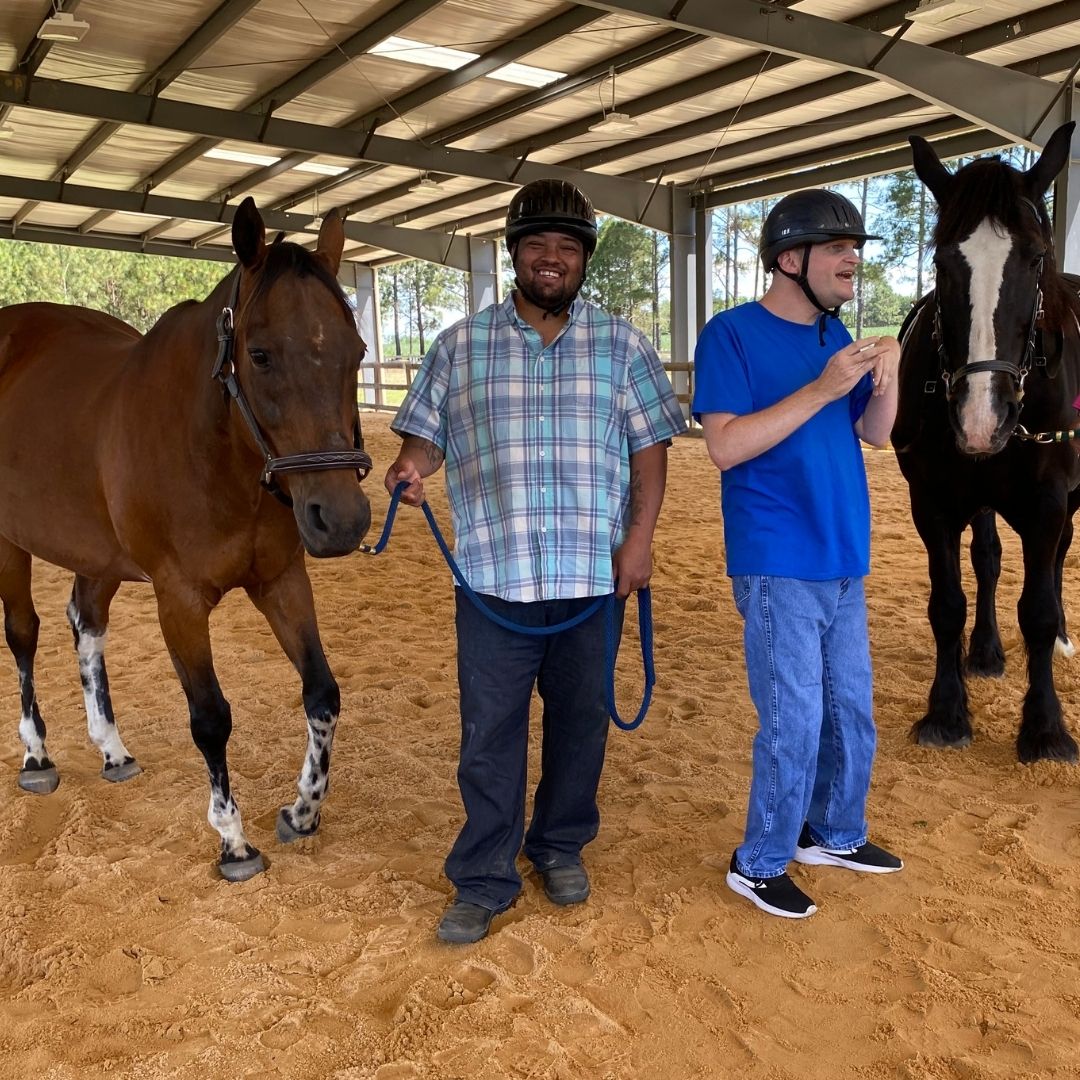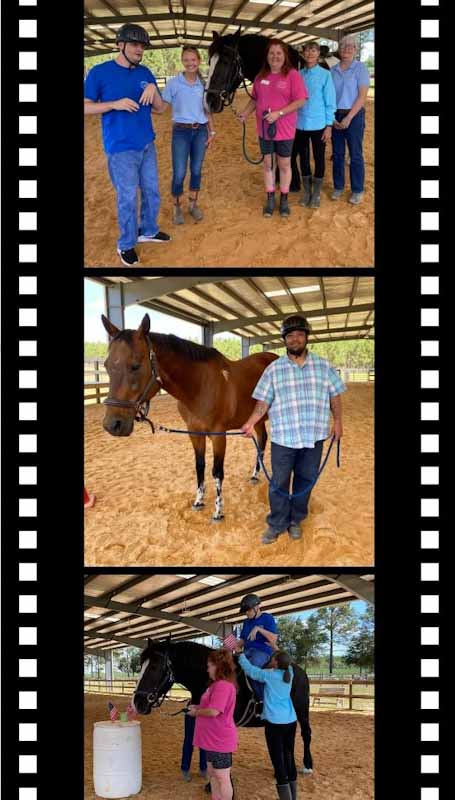Therapeutic Horses Offer Sense of Freedom for People with I/DD

At Prancing Horse Center for Therapeutic Horsemanship in Hoffman, at left, Mitchell McLeod holds the reigns of Jasper, and Jonathan McCrann stands next to his horse, Lana.
Mitchell McLeod and Jonathan McCrann’s best friends are quiet, patient and could easily pull thousands of pounds. The pair, who regularly visit Prancing Horse Center for Therapeutic Horsemanship in Hoffman, have forged close friendships with their equine partners, Jasper and Lana.
McLeod and McCrann both attend Monarch’s Creative Arts and Community Center (MCACC) day program for adults with intellectual and developmental disabilities (I/DD) in Southern Pines, and take part in weekly visits attending Prancing Horse.
Jasper, in his early 20’s with a chocolate brown coat, is an Appaloosa thoroughbred cross gelding, and is paired with McLeod. Lana, 17 years old, is a Percheron mare with a white strip on her face that stands out against her rich, black coat, and is McCrann’s willing mentor. Both horses have a gentle demeanor that makes for wonderful teamwork with their riders as if they realize the important work they are accomplishing.
Therapeutic horseback riding can benefit individuals with a wide range of challenges that can include cognitive, physical, emotional, social or a combination including I/DD. Horseback riding is known to benefit independence and mobility for a person with disabilities who may be otherwise restricted. Therapeutic horseback riding offers physical and psychological benefits for individuals who don’t typically have the opportunity for such activities.
At Prancing Horse, the shaded horse training ring has a backdrop of lush trees typical of rural, southern North Carolina. A wooden plank fence surrounds the riding shelter with cones and other equipment strategically placed throughout the ring and used during the lessons. Riders stand on a lifted platform in order to mount their horse and are guided by one to three volunteers to ensure safety.

Top to bottom: From left, Jonathan McCrann, Claire Sullivan, and volunteers Sharon Hakas, Fonda Greene and Rita Smith pose with Lana. Mitchell McLeod practices with Jasper during a session. Jonathan McCrann, riding Lana, works on hand mobility with volunteers Fonda Greene, center, and Sharon Hakas, left.
Prancing Horse Director of Veterans Services Susan Price explains that the sessions lay the groundwork for what is needed to ride and care for a horse which includes grooming and leading with the added benefit of learning important life skills: “Our riders take what they learn here and it often translates into confidence and caring in other aspects of their lives.”
Getting ready for his session with Lana, McCrann becomes eager and motivated. Wearing his black riding cap and aided by a staff member and two volunteers, he rides his horse through an obstacle course using verbal cues and with assistance from the trainers when to use the reigns.
Prancing Horse Program Director Claire Sullivan explains that during this session the staff work with McCrann on improving mobility in both of his hands with a variety of games and exercises. McCrann concentrates intently on using the verbal commands needed and proudly tells Lana, “There we go” and “Nice job!” when the horse responds to his cues.
Prancing Horse, which has a wide variety of programs for children through adults, adapts each riding session to the physical or mental health needs of the individual.
Sullivan said therapeutic horseback riding lessons impact individuals in a variety of ways: “It doesn’t matter if there is physical or mental impairments, horses are able to be a great equalizer. Prancing Horse teaches how to ride but also develop life skills. What is learned in the saddle can also be turned into riding a bike or helping a rider walk or improve those fine motor skills and changing their life in all regards.”
McLeod has forged an especially close relationship with his horse, Jasper.
“He is the best horse and my best friend. I can take him off the rope and he will walk with me. He makes me happy because he listens to me,” McLeod says while looking into Jasper’s eyes. McLeod learns how to care for Jasper as well, grooming and brushing his coat.
Direct Support Professional Remicka Williams, who attends the Prancing Horse visits with McLeod, says she can see a positive change in him following sessions at Prancing Horse.
“He has a sense of something to look forward to, something just for him,” Williams shares. “He seems more alive. A lot of days he is sad. Just having Prancing Horse time as an outlet, he comes to life, is energetic and talking.”
Similar to McLeod and McCrann, Sullivan notes that almost all riders over time develop a close relationship with their horse. “Horses are incredibly intuitive creatures. They are able to sense a heartbeat from four feet away,” she notes.
Posted on: Tuesday January 25, 2022
